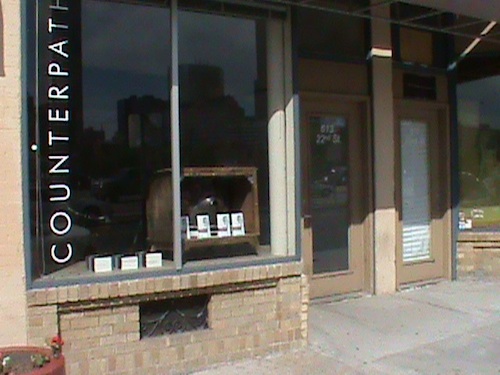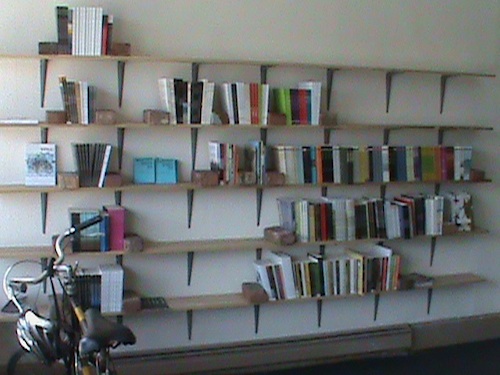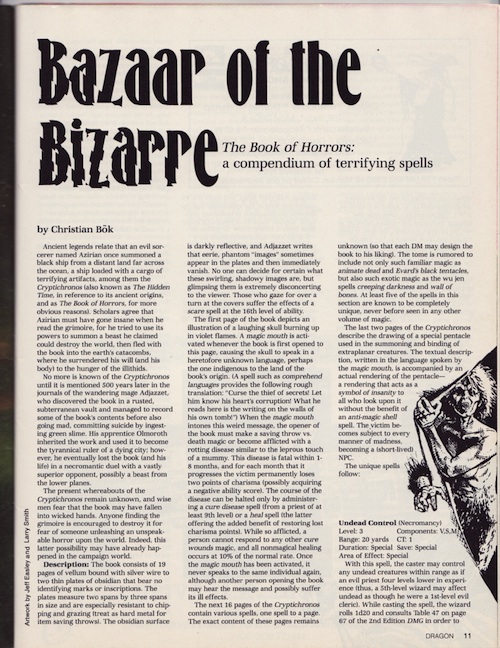Who: Julie Carr and Tim Roberts
What: Counterpath
When: Wendesday, May 11, 2011
Where: Denver, Colorado
“Open Door” features audio, video, and online media to document dynamic interactions between poetry and its audience. “Open Door” showcases performance, scholarship, and engagement outside the usual boundaries of slams, workshops, and book publications. This week: The Counterpath storefront in Denver, Colorado.
***
When I was in high school in south Florida, the highlight of the week was a trip to the record shop. There, I became pals with Jimbo, a local hardcore kid like myself, who would offer me and my friends a brief synopsis on the latest seven inch records in stock. These were small records, manufactured in batches of around 1,000 copies, by bands from across the country, made up of kids into pretty much the same music as we were. My friends and I quickly learned to expect certain styles from specific record labels. Lookout tended toward pop-punk, Wreckage captured the New York hardcore sound, Vermiform offered intellectually-tinged political spitfire. Each of these labels professed an allegiance to the DIY punk ethic—the notion that the means of production should be in the hands of those who are actually making the music, rather than some distant, unaffiliated record executive who cares only about turning a profit.
It was through the labels themselves, through their constellation of various aesthetics, geographic areas, or even political affinities that one could figure out what was then going on in punk and hardcore music. For years, this meant everything to me. Then, I fell in love with poetry.
It was a bewildering experience to walk into a used bookstore with an ample poetry section and try to figure out where, exactly, to start. But it wasn’t all that different from my experience with punk rock. Instead of relying on record labels, I started paying attention to the presses.
The real bedrock of this transition was New Directions. Even if I didn’t respond immediately to something they’d published, I knew it was good for me, knew it was valuable to tackle, a way to learn the field. That discovery led to others, to City Lights, Burning Deck, Black Sparrow. Although there was often overlap in the sort of work these presses published, they seemed to each have a unique center, a distinctive aura about the type of poets they championed through publication. Somehow, this uniqueness felt like an argument, like a polemic for what constitutes a work of value in poetry.
I’m still drawn to presses that function this way, the visionary minimalism of Flood Editions; Action Books’s neo-grotesque; the nouveau roman underpinnings of Leon Works; Edge Books and its slant toward intelligent zaniness; and on my own home turf, Denver’s Counterpath Press. Tim Roberts and Julie Carr started Counterpath in early 2006, just before moving from Oakland, California to Denver, where Carr landed a job in the nearby MFA program in Creative Writing at the University of Colorado at Boulder.
In the interest of full disclosure, Carr and I are colleagues in this program; in fact, I consider both Tim and Julie to be not only good friends, but visionary culture workers. But isn’t it nefarious nepotism to write an article about one’s friends? Well, no, not at all. Something Joshua Beckman said nearly a decade ago on a panel during the University of Massachusetts’ annual Juniper Festival has stuck with me. Someone in the audience was complaining about the decision of then-fledgling Verse Press to publish books by friends of the editors. Beckman considered the complaint for a minute and then replied: “They’re your friends because of their poems.” Or something like that. The point was that friendship and taste and poetry were inextricably bound together. I can’t help but feel that those presses actively working to create what Robert Creeley called a company—not in an economic sense, but as companionship, something familial—are doing it right, doing it authentically.
But can a press do something more to feed this sense of company than just publishing and promoting books? The folks at Counterpath Press answered this question definitively in the affirmative with the recent grand opening of their hybrid bookstore, art gallery, and performance space, called, fittingly enough, Counterpath. Located between Denver’s Central Business District and the Five Points neighborhood, just out of reach of the shadow of Denver’s handful of skyscrapers, Counterpath opened its doors at 613 22nd Street on the evening of Friday, May 7th. This particular block of 22nd street is vibrantly diverse, home to both the Melbourne International Youth Hostel and the Los Paisanos busline, which features a bus departing daily to El Paso and continuing on into Mexico.
Counterpath’s grand opening was slated for 6pm, forty-five minutes before the bus to Mexico hit the road, so there were already folks milling about on the block when I arrived. Their indifference to whatever was going on in the shop next door shifted to a half-hearted curiosity as more people began to stream in. A little boy sucking on an unnaturally bright orange freeze-pop peaked his head in the window, trying to see what all the commotion was about.
And this is part of the charm of the space; from the outside, it’s both unassuming and a little mysterious. A display of recent titles published by Counterpath grace the large front window, while inside its high ceilings, bare walls, and lack of furniture offer a sense of malleability, as though anything might be possible with the shop. The only permanent fixture in the place, and the real clue as to what it’s all about, were the half dozen book shelves lining one of the walls. Alongside Counterpath titles, there were those by Avenue B Press, Atelos, Octopus Books, and many other small press publishers.
Rather than the standard alphabetical arrangement, the shelves were organized by press, giving a browser an immediate sense of the scope and interest of the publishers whose work they offered for sale.
“We’re going to have regular events in which we’ll feature a particular press,” notes Julie Carr, “inviting the publisher and/or the authors to come read and talk about the press.”
This evening’s events featured Craig Dworkin, who flew in from Salt Lake City, to give a talk on Eclipse, the online archive of avant-garde works that he curates.
A few dozen folding chairs were set up, and folks started claiming these with jackets and bags, while others hit the wine and cheese table. Eventually, the room was full of the chatter and camaraderie one comes to expect from a reading, pockets of serious discussion, peppered by laughter, and those waiting around for things to get underway. A computer projected the image of an eclipse onto one of the walls. Several children ran around the crowded room. Soon, Roberts officially kicked off the evening, welcoming guests with a brief introduction to Counterpath Press and its new store, explaining that “we’ve come here as an extension of publishing books and what publishing books has taught us, but now with an idea that it’s what we can do…in the poetics of space that brings new relevance.”
Afterwards, Carr introduced Dworkin, who presented a range of materials from the Eclipse archive, projecting images from old mimeographed books on the wall, while playing recordings of the poets themselves reading the work. We were treated to the likes of Clark Coolidge, Robert Grenier, Bernadette Mayer, and P. Inman. The real thrust of Dworkin’s talk revolved around the paradox of an avant-garde archive.
“The act of archiving is inherently conservative,” Dworkin explained, “the point of the archive is to conserve something of the objects it contains, but it does so for a future generation: anticipating some user and some use, some moment for which the archived material is being saved.”
He continued to unpack the paradox by noting that he was “conservatively treating radical materials,” and that “although Eclipse may look, at first glance like a mausoleum focused on the archaic past the concern of the archive is in fact the amnesiac present, and a future that the archive believes will still be in need of the avant-garde lessons which previous generations never fully learnt from the generation before.”
Dworkin closed his talk with a spirited reading from what he called the archive’s most bizarre holding—an article from a 1990 issue of Dragon Magazine, which revolved around a mysterious text of spells called the Cryptichronos, and was written wholly in Dungeons & Dragons parlance, replete with mention of saving throws and non-player characters. The article, it turns out, was the very first publication by Christian Bök, one of Dworkin’s longtime cohorts, and fellow champions of conceptual poetry.
After a lively question & answers session, it was clear that while Dworkin believes strongly in the value of a particular strain of avant-garde writing practice—evinced precisely by the holdings of the Eclipse archive—he’s also open to plurality, to the possibility and potential of other digital archives: “I don’t want to be the only person doing this,” he said, pointing toward the computer projection “but I want to be the only person doing this one.” It was an auspicious opening for what’s sure to be one of the real gems of Denver’s burgeoning literary scene, and a treat to learn that Dworkin shares with Carr and Roberts the spirit of the DIY ethic, which is not only about creating the spaces and things one wants to see but also about creating a space to house the vision of others who are dedicated to doing so.
Here's a video of the opening night:
Noah Eli Gordon was born in Cleveland and grew up in both Ohio and Florida. He attended Bunker Hill ...
Read Full Biography




